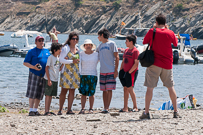
Barcelona Currency Exchange Tips
Should I wait and exchange all my currency when I arrive in Barcelona?
The Euro officially became the currency of the European Union in 1999. After three years of overlapping the Spanish Peseta, the Euro became the accepted currency in Barcelona. The Euro simplified the exchange system throughout Europe, but not without some adjustments. The concept of rounding up prices did cause some confusion, as well as controversy.
A cup of coffee in pesetas cost 81 euro cents, but when the Euro took over in 2002 that same cup of coffee became 1 Euro. Barcelona's tourist industry was affected by the conversion to euros; restaurant, hotel and bar prices increased overnight. Barcelona was considered a budget destination before the currency switch and still is, when it's compared to Paris or London, but it does rival expensive U.S. cities in hotel accommodations and restaurant prices. Barcelona is a cosmopolitan, as well as modern city where you can still find travel bargains, because the city caters to all tastes and budgets. By staying away from tourist traps and exchanging currency at a favorable rate, anyone can enjoy the beauty of Barcelona without going into sticker shock and a budget meltdown.
Exchanging your currency for euros takes research, patience and help from a professional currency broker before you leave home. A professional will help you identify real time currency rates and will explain how your currency compares to the Euro in terms of past, present and future value. A broker can help you average exchanges while you're planning the trip, which will offset a sudden value surge that can destroy a budget. Most travelers who want to save money when they exchange currency use a broker, because there are no hidden fees or surcharges and you actually can exchange money using a real time rate, which includes a small profit for the broker. Some travelers exchange all their currency with a broker and others exchange part of it and wait until they arrive in Barcelona to exchange more money if they need it.
How should I exchange money in Barcelona if I need it?
If you do interact with a currency broker, you have a good idea of the value of your currency in euros. That information will help identify Barcelona currency merchant's that charge excessive fees or have inflated the rate to make a hefty profit.
The first tip to remember if you need to trade currencies in Barcelona is to stay away from Barcelona's Airport cambio or exchange bureau. The cambio pays expensive airport rent and wants to make a decent profit from a captive audience, so avoid the cambio, if you want to save money.
Next, forget about exchanging money at your hotel or a retail shop. You're going to pay a high price for those exchanges. If you do need to exchange currency, find a commercial bank that has an international presence. Those banks get a better real time rate than smaller banks and may charge you a smaller exchange fee.
Credit card companies add several fees and surcharges to transactions in Barcelona, so in order to eliminate those fees use your ATM card. If you pay for purchases with your ATM card you avoid the extra surcharges that are part of regular credit card transactions. Cash points or cash machines in Barcelona will not accept ATM cards with five and six digit pin numbers, so make sure you have a four digit pin. Banks do charge a fee for using the machine, especially if it's an international transaction and your bank may charge you a fee for a withdrawal as well, so it can get expensive if you do it more than a few times. The trick is to take larger sums to reduce the percentage cost of your withdrawal.
Other travel tips
Spain does have a €10,000 cash limit when you go through customs. If you have more than that amount, you must declare it. Carry cash in a money belt, leg pouch or hidden pocket that's secure and out of sight and use hotel safes and other security measures when you arrive. Common sense is always your best security when you remember to use it.







 Tel:
Tel:

 Client Gallery
Client Gallery

